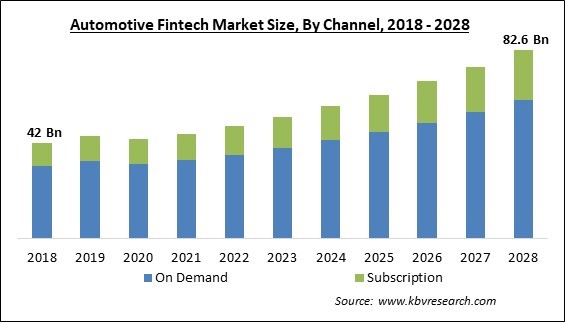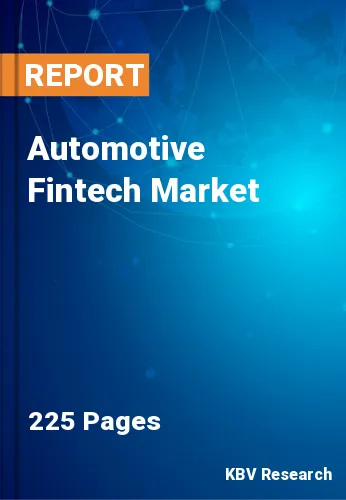The Global Automotive Fintech Market size is expected to reach $82.6 billion by 2028, rising at a market growth of 9.0% CAGR during the forecast period.
A subset of financial technology called "automotive fintech" caters to the need for digital financial services in the auto sector. Digital insurance, car payments, digital leasing, and other services are all part of the automotive fintech industry. Automotive fintech companies streamline and automate financial processes to simplify buying and running automobiles for customers and businesses. These technologies include machine learning, data analytics, and blockchain.

Automotive fintech includes equipment for managing and owning vehicles and purchasing and financing them. For instance, smartphone applications let users check their vehicle's health and get alerts when repairs are due. Other systems enable customers to hire automobiles for brief periods without going to a rental car office. These systems provide on-demand automobile sharing and rental services.
Most dealerships and car loan financing organizations know that change is necessary and that they must start implementing cutting-edge end-to-end pricing technologies, such as digital loans and purchases. Fortunately, recent developments in cloud and digital technology have made innovations and trends in vehicle finance possible. Auto dealers can now ultimately oversee every element of their lending program due to the sophisticated end-to-end lending software, which integrates cutting-edge technologies like machine learning, advanced data analytics, and artificial intelligence. The usage of such technologies would accelerate market growth.
The variety of products available, and convenience, in 2020–21, pandemic-related reactions and containment measures will raise the relevance of these elements. Fintech companies, big tech companies, and established financial institutions are adjusting quickly to a new business environment. The usage of digital payments and modifications in the buying and selling habits of retail consumers and vendors were two developments accelerated by COVID-19 and thereby propelled the market growth despite the initial restriction to the market growth due to the decline in automotive industry.
The on-demand provision of transportation services to customers through automobiles, taxis, or ride-hailing services is the business of the cab rental industry. With the development of technology and smartphone applications, the industry has seen remarkable growth, making it more straightforward for customers to schedule a trip and track their cars in real-time. Cab companies offer many services, including hourly rentals, point-to-point trips, and airport shuttle services. The collaboration between cab firms and fintech companies for mutual benefits is expected to drive market growth.
The digitization of supply chains is fueled by the continuously growing desire for industries to be more responsible and sustainable globally. Technologies like blockchain and smart contracts will be used to accomplish this objective of traceability and transparency further. The increasing digitalization of the automotive sector provides different growth opportunities for automotive fintech firms to provide better financial services to the consumers and thereby surge market growth.
One-time passwords and other forms of authentication are used by fintech businesses to protect the payment system, but hackers can still access these systems, stealing financial and personal data. While cyberattacks get more sophisticated every day and establishing total security in the digital realm is quite a challenge, financial organizations have always been in danger of data leaks. Yet hackers often use these third-party programs as a point of entry. They allow hackers to pretend to be authorized users to get access without authorization, compromising data security. Data security risk with the fintech firms is anticipated to restrict the market growth.
Based on end-use, the automotive fintech market is segmented into in vehicle payments, online leasing, digital loans & purchase and online insurance. The online leasing segment acquired a significant revenue share in the automotive fintech market in 2021. This is due to the fact that online methods reduce the time it takes to hire a vehicle and the expense of paying personnel to enter data into paper-based records. Also, by removing needless trips back to the office for information or paperwork, these technologies enable rental car firms to monitor cars more effectively and save on costs.

On the basis of channel, the automotive fintech market is divided into on demand and subscription. The on-demand segment held the highest revenue share in the automotive fintech market in 2021. The growth is owing to the fact that with on-demand services, one only pays for what they use. The user gets a custom solution that allows them to function effectively. Moreover, on-demand services guarantee that one may expand the services as and when needed. This is simple to do without spending money on new gear.
By vehicle type, the automotive fintech market is classified into passenger car and commercial vehicle. The commercial vehicle segment garnered a prominent revenue share in the automotive fintech market in 2021. This is owing to the fast development of population and urbanization, growing infrastructures, and expansion in the industrial sector. The industrial sector is increasing in emerging nations, creating opportunities in various industries, including building, mining, and tourism. Due to the rise in commuters brought on by the employment situation, there is a significant demand for public transportation.
Based on the propulsion type, the automotive fintech market is bifurcated into ICE and electric. The ICE segment recorded a significant revenue share in the automotive fintech market in 2021. This is due to the fact that an ICE car delivers higher engine power than the average electric vehicle and is often less costly than an electric or hybrid electric vehicle. Traditional, oil-derived fuels like gasoline or diesel propel a car with an internal combustion engine, and have a minimal fueling time which is the reason behind the high preference of these vehicles.
| Report Attribute | Details |
|---|---|
| Market size value in 2021 | USD 45.6 Billion |
| Market size forecast in 2028 | USD 82.6 Billion |
| Base Year | 2021 |
| Historical Period | 2018 to 2020 |
| Forecast Period | 2022 to 2028 |
| Revenue Growth Rate | CAGR of 9% from 2022 to 2028 |
| Number of Pages | 225 |
| Number of Table | 420 |
| Report coverage | Market Trends, Revenue Estimation and Forecast, Segmentation Analysis, Regional and Country Breakdown, Companies Strategic Developments, Company Profiling |
| Segments covered | Channel, Vehicle Type, Propulsion Type, End Use, Region |
| Country scope | US, Canada, Mexico, Germany, UK, France, Russia, Spain, Italy, China, Japan, India, South Korea, Singapore, Malaysia, Brazil, Argentina, UAE, Saudi Arabia, South Africa, Nigeria |
| Growth Drivers |
|
| Restraints |
|
Region-wise, the automotive fintech market is analyzed across North America, Europe, Asia Pacific, and LAMEA. The North America region held the highest revenue share in the automotive fintech market in 2021. This is because the automotive sector has advanced remarkably in the region. This is owing to availability of a large number of automotive fintech service providers in the region. There is a robust support by the government towards the sales of EV vehicles and giving financial aid to the auto financing. The rising awareness regarding the environmental conservation which is further fueling the demand for EVs providing more growth opportunities for the automotive fintech market.
Free Valuable Insights: Global Automotive Fintech Market size to reach USD 82.6 Billion by 2028
The market research report covers the analysis of key stake holders of the market. Key companies profiled in the report include Kuwy Technology Services Pvt Ltd. (Volkswagen Financial Services AG) (Volkswagen AG), Creditas Soluções Financeiras Ltda., Euroclear SA/NV (Euroclear Holding SA/NV), Grab Holdings Inc, Blinker Inc., The Savings Group, Inc. (Autopay), Cuvva Limited, RouteOne LLC, By Miles, and AutoFi, Inc.
By Channel
By Vehicle Type
By Propulsion Type
By End User
By Geography
The global Automotive Fintech Market size is expected to reach $82.6 billion by 2028.
Automotive industry's digitalization are driving the market in coming years, however,Concerns regarding security and privacy of the fintech firms restraints the growth of the market.
Kuwy Technology Services Pvt Ltd. (Volkswagen Financial Services AG) (Volkswagen AG), Creditas Soluções Financeiras Ltda., Euroclear SA/NV (Euroclear Holding SA/NV), Grab Holdings Inc, Blinker Inc., The Savings Group, Inc. (Autopay), Cuvva Limited, RouteOne LLC, By Miles, and AutoFi, Inc.
The Digital Loans & Purchase segment is generating highest revenue share in the Global Automotive Fintech Market by End Use in 2021 thereby, achieving a market value of $37.8 billion by 2028.
The Passenger Car segment is leading the Global Automotive Fintech Market by Vehicle Type in 2021 thereby, achieving a market value of $59.8 billion by 2028.
The North America market dominated the Global Automotive Fintech Market by Region in 2021, and would continue to be a dominant market till 2028; thereby, achieving a market value of $29.4 billion by 2028.
Our team of dedicated experts can provide you with attractive expansion opportunities for your business.

